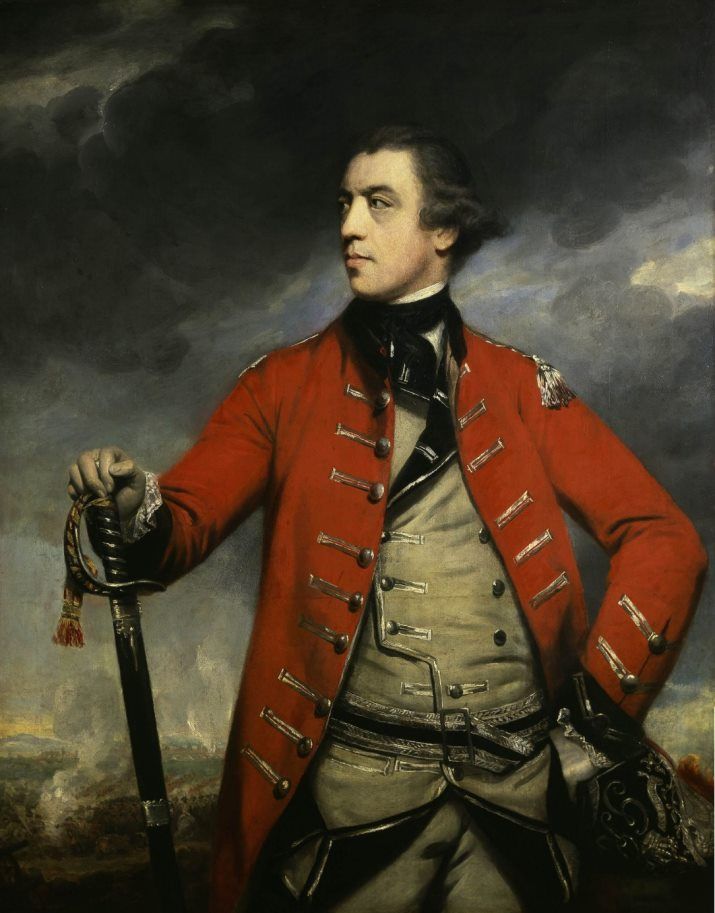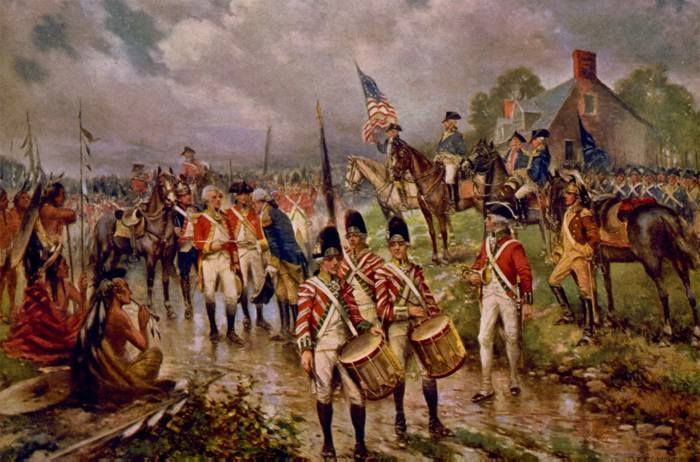On This Day in History -
September 19, 1777
The Battle of Freeman's Farm
On this day in history, September 19, 1777, the Battle of Freeman's Farm is the first of the Battles of Saratoga which culminated in the surrender of British General John Burgoyne's army. The battles were a major turning point in the American Revolution that encouraged France and Spain to join the war on the American side.
In 1777, the British began an effort to divide New England from the middle and southern colonies. The plan was to send General Burgoyne down Lake Champlain from Quebec; Brigadier General Barry St. Leger would cut across New York from the west; and General William Howe would come from New York City up the Hudson River. The three groups would meet at Albany.
General Burgoyne left Quebec in June and reached Saratoga by mid-September, but St. Leger's force was stopped at Fort Stanwix and turned back by Benedict Arnold. General Howe took the bulk of his forces to capture Philadelphia, instead of going to meet Burgoyne, leaving Burgoyne isolated. In addition, Burgoyne lost 1,000 men at the Battle of Bennington who were supposed to bring him support. Burgoyne had trouble getting supplies and communications across the vast wilderness and most of his Indian allies abandoned him after the loss at Bennington.
The American army under General Horatio Gates had dug in at Bemis Heights, about ten miles south of Saratoga. On the morning of September 19, Burgoyne decided to attack. Benedict Arnold understood that Burgoyne would attack the American left flank and ordered his men through the wilderness to meet him.
Colonel Daniel Morgan's sharpshooters met the British near Loyalist John Freeman's farm and the battle began. Morgan's sharpshooters picked off nearly every British officer in the British vanguard, driving them back into the main British army, which began firing on their own men.
Fighting took place all day around the farm, with both sides variously winning or losing the battle. The battle finally went to the British when German Baron, Friedrich Adolf Riedesel attacked the American right flank. Darkness began to fall and the Americans retreated to their defenses at Bemis Heights.
Burgoyne won the first of the Battles of Saratoga, although it cost him 600 men, which he could not afford to lose, including most of his artillery soldiers. The Americans lost half that number. Following the Battle of Freeman's Farm, Burgoyne was faced with a perplexing decision. Should he continue the battle, or wait for reinforcements? He quickly sent word to General Henry Clinton in New York, who had been left in command there with a small force to guard the city after General Howe left for Philadelphia.
Clinton quickly sent troops up the Hudson to distract Gates and hopefully pull him away from Burgoyne. Clinton's help finally came too late though. Burgoyne went to battle again on October 7 and this time Gates' army was victorious. Burgoyne was forced into retreat and surrendered his entire army on October 17th at Saratoga.
The victory caused celebration throughout the colonies, which were especially despondent after the capture of Philadelphia in September. France and Spain joined the war officially upon seeing that the Americans could truly stand up against the British army. Their involvement forced Britain into a worldwide war that reduced British numbers in America and eventually led to their defeat at Yorktown.
- Read what happened on other days in American history at our On This Day in History section here
This Week in History
- September 19, 1777 - The Battle of Freeman's Farm
- September 20, 1777 - The Battle of Paoli
- September 21, 1776 - The Great Fire of New York
- September 22, 1776 - Nathan Hale is hanged
- September 23, 1780 - Benedict Arnold's treason is discovered
- September 24, 1755 - Chief Justice John Marshall is born
- September 25, 1775 - Ethan Allen is captured
Published 9/19/13
Return to top of the Battle of Freeman's Farm
Revolutionary War and Beyond Home
Like This Page?
© 2008 - 2022 Revolutionary-War-and-Beyond.com Dan & Jax Bubis













Facebook Comments